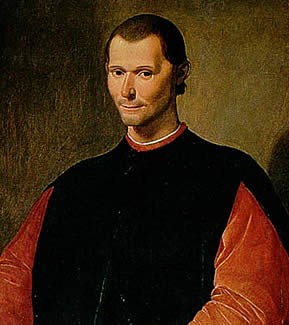Dominique Venner
Translated by Greg Johnson
Ex: http://www.counter-currents.com/
 Even his own name has been turned against him. Indeed it is hardly flattering to be described as “Machiavellian.” One immediately envisions a hint of cunning and treacherous violence. And yet what led Machiavelli to write his most famous and scandalous works, The Prince
Even his own name has been turned against him. Indeed it is hardly flattering to be described as “Machiavellian.” One immediately envisions a hint of cunning and treacherous violence. And yet what led Machiavelli to write his most famous and scandalous works, The Prince, was concern for his fatherland, Italy.In his time, in the first years of the 16th century, he was, moreover, the only one who cared about this geographical entity. Then, one thought about Naples, Genoa, Rome, Florence, Milan, or Venice, but nobody thought of Italy. For that, it was necessary to wait three more centuries. Which proves that one should never despair. The prophets always preach in spiritual wastelands before their dreams rouse the unpredictable interest of the people.
Born in Florence in 1469, dying in 1527, Niccolò Machiavelli was a senior civil servant and diplomat. He participated in the great politics of his time. What he learned offended his patriotism, inciting him to reflect on the art of leading public affairs. Life enrolled him in the school of great upheavals. He was 23 years old when Lorenzo the Magnificent died in 1492. That same year, Alexander VI Borgia became pope. He temporarily made his son Cesare (in this time, the popes were not always celibate) a very young cardinal. Then he became Duke of Valentinois thanks to the king of France. This Cesare, who was tormented by a terrible ambition, never troubled himself about means. In spite of his failures, his ardor fascinated Machiavelli.
But I anticipate. In 1494, an immense event occurred that upset Italy for a long time. Charles VIII, the young and ambitious king of France, carried out his famous “descent,” i.e., an attempt at conquest that upset the balance of the peninsula. After being received in Florence, Rome, and Naples, Charles VIII met with resistance and had to withdraw, leaving Italy in chaos. But it was not over. His cousin and successor, Louis XII, returned in 1500, staying longer this time, until the rise of Francis I. In the meantime, Florence had sunk into civil war and Italy had been devastated by condottieri avid for plunder.
Dismayed, Machiavelli observed the damage. He was indignant at the impotence of the Italians. From his reflections was born The Prince, the famous political treatise written thanks to a disgrace. The argument, with irrefutable logic, aims at the conversion of the reader. The method is historical. It rests on the comparison between the past and the present. Machiavelli states his conviction that men and things do not change. He continues to speak to the Europeans who we are.
In the manner of the Ancients – his models – he believes that Fortune (chance), illustrated as a woman balancing on an unstable wheel, determines one half of human actions. But, he says, that leaves the other half governed by virtue (the virile quality of audacity and energy). To the men of action whom he calls to do his wishes, Machiavelli teaches the means of governing well. Symbolized by the lion, force is the first of these means to conquer or maintain a state. But it is necessary to join it with the slyness of the fox. In reality, it is necessary to be lion and fox at the same time: “It is necessary to be a fox to avoid the traps and a lion to frighten the wolves” (The Prince, ch. 18). Hence his praise, stripped of all moral prejudice, of pope Alexander VI Borgia who “never did anything, never thought of anything, but deceiving people and always found ways of doing it” (The Prince, ch. 18). However, it is the son of this curious pope, Cesare Borgia, whom Machiavelli saw as the incarnation of the Prince according to his wishes, able “to conquer either by force or by ruse” (The Prince, ch. 7).
Put on the Index, accused of impiety and atheism, Machiavelli actually had a complex attitude with respect to religion. Certainly not devout, he nevertheless bowed to its practices. In his Discourses on the First Ten Books of Titus Livy, drawing on the lessons of ancient history, he wonders about the religion that would be best suited for the health of the State: “Our religion placed the supreme good in humility and contempt for human things. The other [the Roman religion] placed it in the nobility of soul, the strength of the body, and all other things apt to make men strong. If our religion requires that one have strength, it is to be more suited for suffering than for strong deeds. This way of life thus seems to have weakened the world and to have made it prey for scoundrels” (Discourses, Book II, ch. 2). Machiavelli never hazarded religious reflections, but only political reflections on religion, concluding, however: “I prefer my fatherland to my own soul.”
Source: http://www.dominiquevenner.fr/#/edito-nrh-53-machiavel/3813836




 del.icio.us
del.icio.us
 Digg
Digg
Commentaires
Beaucoup d'Européens ne peintures amour. En fait la plupart des artistes anciens combattants viennent de pays en Europe. J'admire la façon dont ils ont fait leur toile, surtout si le sujet est la nature.
Écrit par : "cold sore remedies " | mardi, 19 avril 2011
Les commentaires sont fermés.